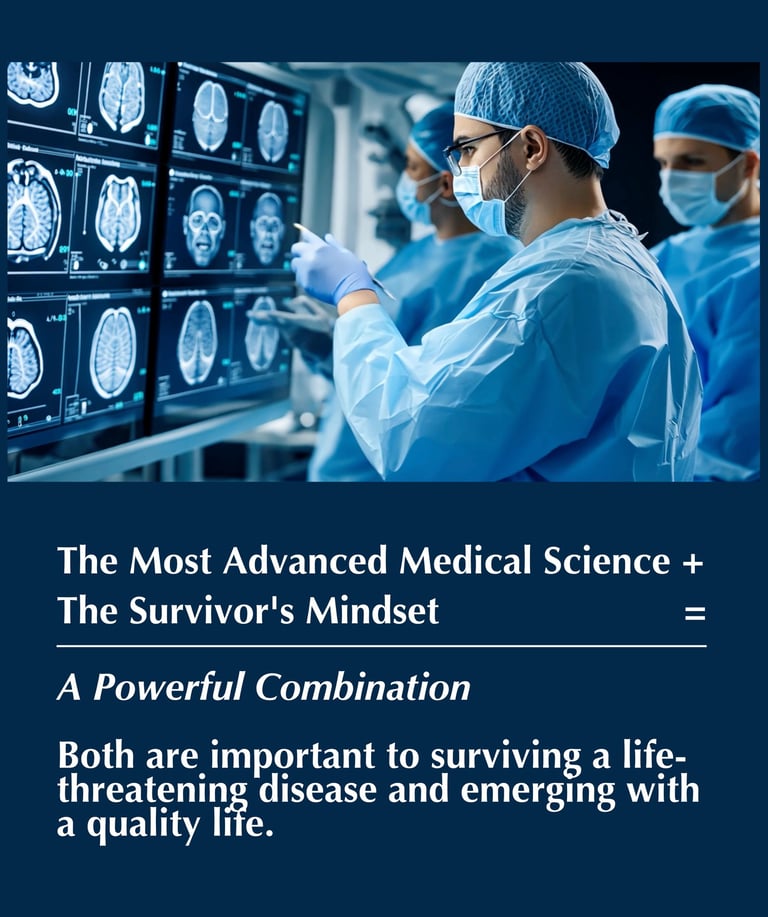Survival Strategy


Summary
Focus on your goal: surviving with a quality life. Embrace a survivor’s mindset, not a victim’s. You’ll have good days and bad, positive and negative test results. It may be a long journey; I found it was easier after I learned to avoid huge emotional swings.
Respect physicians but question their advice thoughtfully. If a doctor calls your disease terminal, don’t accept or reject it outright—it may or may not be true. Physicians are essential, but not every suggestion may be the best path for you.
In physician meetings, stay alert for small clues—a passing comment or new information—something that could lead us to a novel treatment or important new clinical trial.
Be a “Good” Patient (But Survive)
Have the mindset of a survivor.
Sounds easy but it isn’t. The tendency is to surrender to the oncologist or other medical specialist even if they hold little or no hope of recovery or a quality life. Stay empowered, not defeated. Learn more about this approach in our blog post, The Survivor Mindset, here.
Maintain your equilibrium.
Beware of the emotional roller coaster — good checkups, CT scans, MRIs followed by setbacks followed by good results. To the extent possible, maintain your equilibrium. If recent results are favorable, don’t get overly celebratory. If results are adverse, don’t get discouraged. The ups and downs can lead to burnout and discouragement. As Dag Hammarskjöld, Secretary-General of the United Nations, wrote in his journal:
“. . . only he who keeps his eye fixed on the far horizon will find the right road.”
Your relationship with your physician(s).
Much obviously depends on your relationship with your physicians. I've had a wide variety of experiences, from wonderful to miserable. You need them to survive. They will know a lot about your disease. The crucial consideration is whether or not they have a solution. If they do, if there is a reasonable expectation of a favorable result — recovery with a good quality of life — take their advice and stick with them unless there is absolutely no rapport and the experience is demeaning or particularly negative. If it is, move on to another oncologist or specialist who focuses on your specific disease and whose location is convenient.
If they don't have a solution — if the prognosis is terminal, or the proposed surgery or other treatment is likely to result in a significant deterioration in quality of life — the real work begins. The questions to explore:
How reliable is the diagnosis? Seek a second opinion from a respected specialist and have another pathologist review your biopsy, preferably at an AI-based pathology lab. Misdiagnosis is an unfortunate reality — I've recently come across research indicating a 30% error rate. If true, that's a huge problem. According to the NIH (National Institute of Health) 10-15% of diagnosis are wrong. (Report Highlights Public Health Impact of Serious Harms From Diagnostic Error in U.S., Johns Hopkins Medicine, 7/17/2023) You don't want to get chemotherapy for a cancer you don't have, or when you in fact need radiation or surgery rather than chemo.
I remember once, waiting in an operating theatre for my oncologist to go into the next room and take a look at the bone marrow biopsy he had just extracted. First, I heard a long exhale. The nurses in the operating room gave one another a furtive glance. Then the doctor walked in and said, "It indicates mantle cell lymphoma, which can't be right because if it were, you would have been dead long ago." Pathology is sometimes an art not a science. In the case of dire diagnosis, always get a second opinion.
How reliable is your prognosis? What does the actual data say about survival rates? Because your provider doesn't have a solution doesn't mean no one does.
What are the identifiable characteristics, if any, of the survivors?
What is the emerging science? Is survival improving over time? If it is, favor treatment over palliative care. They are obviously on the right track. Their next advance may be major and in the meantime the standard-of-care may keep you alive.
What is the survival rate in Canada, Europe, Japan, Australia? If better than in the US, what are they doing differently? Are there practitioners or trials using those therapies anywhere in the US?
If none of these considerations offer hope based on hard data, the next question is what do specialists in your disease do when facing a similar diagnosis. If they overwhelmingly opt for palliative care rather than treatment, for instance because treatment has a major, adverse impact on quality of life, that may be worth considering.
"Fighting" the disease is also always an option. I was diagnosed with a terminal cancer at the age of 33. I had three young sons. I wasn't going to give up, regardless of the data. And so I "fought" and won a battle with a almost zero chance of success, according to the experts. And, in my case, my quality of life was high during the "wait and see" period, which lasted eighteen months (there was, thirty-five years ago, no benefit to early treatment). Even in the later stages of chemo during which I had shingles, was anemic and a borderline hemophiliac my quality of life was good. I had been a competitive athlete up until the age of 31 (amateur boxing) and was still in good shape. I don't remember ever having nausea. I lost most but not all of my hair. I was able to travel and so took advantage of that period of relative health to visit experts all over the country. I also visited a naturopath, a hypnotist, a psychiatrist and a psychic healer — anyone who might have something to offer — though in reality none of them did.
Present yourself as a proactive patient—dress neatly, engage respectfully. Subconscious impressions matter. Seek doctors who dig deeper, offer honesty, and think creatively about tough prognoses. Physicians deserve the benefit of the doubt. A couple became personal friends. I've also had not good experiences. In my two cancer journeys, I’ve had at least fifteen physicians. I look for someone with that special insight, that desire to dig a little deeper, to find solutions rather than problems. When diagnosed with a serious illness for which there is no known cure, I'm looking for an ally. I'm looking for honesty even when the view presented is not what I hope to hear. I'd prefer empathy and understanding — a physician who can imagine themselves in my place — though that's not necessary. I want an imaginative, intuitive thinker when dealing with a difficult prognosis.
But sometimes, even seeking a second opinion can, depending on the egos involved, send things down a negative track. Don’t worry about that. Studies indicate that physicians’ least favorite patients (i.e. the ones that question them) out-survive their favorites. Your objective is a quality life. You need to maintain your sense of control, your belief in your ultimate recovery. Elements of the health care system are demeaning, either inadvertently or to enhance efficiency. Many providers simply don’t care about you or your problem. Many providers tolerate patients because they can’t figure out a way to run the health care system without them. Maintain your dignity. Above all, maintain your ability to think independently.
Finally, you have the right to decline any diagnostic procedure or course of treatment suggested to you. I've turned down many, although probably not enough. For instance, physicians love to order CT scans. I've had perhaps thirty over the course of my two cancer treatments, including two on the same day once, both conducted by a tall, lanky, pimply-faced kid who looked to be no more than sixteen. He screwed up the first one. All those CT scans may have been a contributing factor in my second cancer:
A study published in The Journal of the American Medical Association, Internal Medicine projects that CT scans performed in 2023 could lead to approximately 103,000 future cancer cases over the lifetimes of those scanned. This is estimated to be roughly 5% of all new cancer cases diagnosed annually. While the risk per scan is low, the high number of CT scans performed annually contributes significantly to this projected cancer burden.
The risk of cancer from CT scans is due to the ionizing radiation used during the procedure. The large number of scans performed (93 million in 2023) adds up to a substantial number of potential cancers.
Since previous studies suggest that a third of diagnostic tests are unnecessary, that means that twenty million adults and more than one million children having CT scans are needlessly being put at risk. (Report Links Increased Cancer Risk to CT Scans, New York Times, November 29, 2007)
Clinical Trials
Clinical trial research is an important part of what we do. While representing the forefront of medical progress and a significant source of hope for many, clinical trials are often difficult to access and comprehend due to their intricate eligibility requirements, varying phases, and the need to weigh potential risks against benefits. Using the power of AI, we're constantly searching for trials you might qualify for and for emerging therapies that could be game-changers.
We get the crucial information you need to make a decision on which trial or trials to apply for. When you decide on one, we help navigate the sometimes complicated and laborious process of enrolling.
Your Personal Research Team
Ultimately, we're on a search for an elusive but not impossible solution. Every day, researchers around the world are making discoveries that are changing lives for the better. Breakthroughs happen in laboratories from Boston to Beijing, in small studies and major trials. Somewhere out there, someone is working on exactly what you need. Our mission is to make sure you have access to the latest medical science. We're not just offering research — we're offering hope backed by science.
Think of us as your personal research team, dedicated to finding every possible option for your specific condition. We translate complex emerging medical science into clear, practical insights that you can use.
Schedule a no-obligation, no-cost consultation to explore the options.
The astonishing pace at which medical medical science is evolving is both an opportunity and a challenge to patients. We cut through the complexity to put together a clear plan to navigate the maze.


Be in touch if you've received a serious diagnosis and would like to talk.
(843) 284-6850 (Office)
(843) 802-0183 (Mobile)
